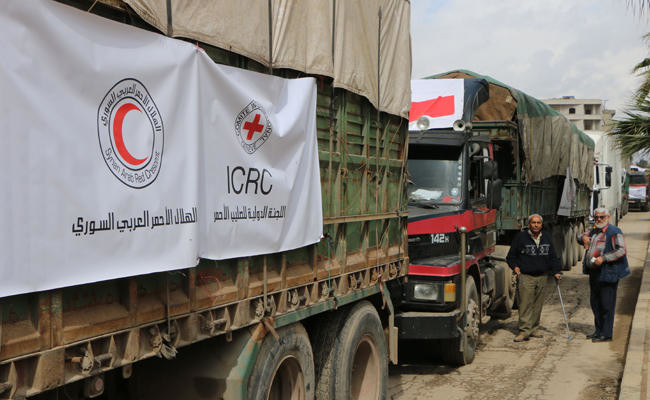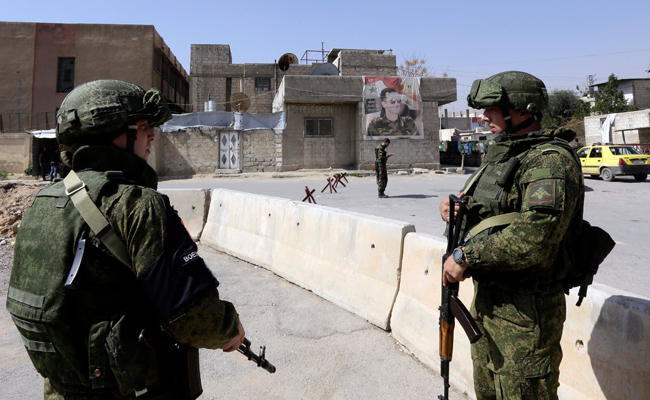WAFIDEEN CHECKPOINT, Syria: Syrian and Russian forces kept up military pressure on opposition-held Eastern Ghouta on Thursday as their controversial unilateral truce failed to yield a humanitarian breakthrough.
More than 40 trucks loaded with aid were unable to reach the 400,000 people living in the battered enclave, prompting fresh calls for a UN cease-fire to be implemented.
A five-hour daily “pause” announced by Moscow on Monday has led to a reduction in the bombardment that killed hundreds in only a few days and sparked global outrage last month.
But a corridor offered by Russia for civilians to flee remained ostensibly empty for a third day running, with distrust running high on both sides.
Jan Egeland, the head of the UN’s humanitarian taskforce for Syria, said he hoped aid convoys “may now be able to go to Eastern Ghouta in the next few days.”
He told reporters in Geneva that he had received word during a taskforce meeting on Thursday “that we may have the first facilitation letter, permit from the government, to go to (the main Eastern Ghouta town of) Douma in a very long time.”
But he also stressed that “five hours is not enough.”
Syrian aircraft carried out strikes on Thursday before the 9:00 am start of the daily “truce,” killing nine civilians, according to the Syrian Observatory for Human Rights, a Britain-based war monitor.
Ground battles were also taking place in Al-Shaifuniyah which lies in the enclave’s northeastern region and has been extensively destroyed in recent days.
A spokesman for the Syrian Civil Defense volunteer rescuers, known as the “White Helmets,” said access to the area had been very difficult.
“There is hardly any life there. It is completely destroyed and there are people under the rubble,” said Siraj Mahmud.
Air strikes have eased compared with last week when the joint Syrian and Russian aerial campaign against Eastern Ghouta killed up to 100 civilians a day.
But the death toll for the assault launched on February 18 continued to mount even after Russia’s “humanitarian pause” kicked in, as rescuers found bodies they had been unable to access.
In the town of Hazeh, rescuers working with rudimentary equipment were painstakingly hoisting buckets of gravel from a basement where they feared up to 21 had been buried alive by a strike on Feb. 20.
So far they have only retrieved six bodies.
“I left my daughter in the basement with her husband and his family,” said 60-year-old Abu Mohammed.
“I came back the next morning. I found the building collapsed and until now I haven’t found my daughter nor her husband’s family.”
According to the UN, three quarters of all private housing in Eastern Ghouta has been damaged and hundreds of civilians need life-saving medical evacuations.
The Russian daily “pause” falls far short of a 30-day cease-fire voted for by the UN Security Council on Saturday and yet to be implemented.
UN agencies and aid organizations have argued that the five-hour window was too short for aid deliveries.
“When will your resolution be implemented?” top UN relief official Mark Lowcock asked Security Council members on Wednesday.
Russia and its allies in Syrian President Bashar Assad’s regime have blamed the humanitarian deadlock on the armed groups controlling Eastern Ghouta.
Syrian military sources accused anti-regime forces in Eastern Ghouta of deliberately shelling the designated safe passage to prevent civilians from leaving and keep them as human shields.
A spokesman for Russian military observers monitoring the cease-fire initiative told Interfax news agency that many civilians were trying to leave.
The number of Ghouta residents asking for “assistance and help in getting evacuated from territory controlled by the fighters has increased exponentially over the past 24 hours,” Major General Vladimir Zolotukin said.
AFP reporters at the Wafideen checkpoint, through which civilians were asked to evacuate the enclave, said no movement was reported, however.
The only civilians believed to have fled the enclave since the “pause” took effect are an elderly Pakistani couple who had remained in Ghouta throughout the seven-year conflict but decided to leave when the violence increased.
Mohammed Fadhl Akram, 73, moved to Syria in 1974.
He and his wife, who left on Wednesday and were given shelter at the Pakistani embassy in Damascus, leave two sons, three daughters and 12 grandchildren behind.
“I hope God protects them,” said Akram, who wore a warm hat and sported a trimmed white beard, when he spoke to an AFP reporter in the main eastern Ghouta town of Douma this week.
“I don’t want anything else,” he said.
Syria regime strikes Eastern Ghouta as aid trucks wait
Syria regime strikes Eastern Ghouta as aid trucks wait

Iran foreign ministry affirms support for Syria’s sovereignty

- Assad fled Syria earlier this month as rebel forces led by the Sunni Islamist group Hayat Tahrir Al-Sham (HTS) entered the capital Damascus
Tehran: Iran affirmed its support for Syria’s sovereignty on Monday, and said the country should not become “a haven for terrorism” after the fall of president Bashar Assad, a longtime Tehran ally.
“Our principled position on Syria is very clear: preserving the sovereignty and integrity of Syria and for the people of Syria to decide on its future without destructive foreign interference,” foreign ministry spokesman Esmaeil Baqaei said in a weekly press briefing.
He added that the country should not “become a haven for terrorism,” saying such an outcome would have “repercussions” for countries in the region.
Assad fled Syria earlier this month as rebel forces led by the Sunni Islamist group Hayat Tahrir Al-Sham (HTS) entered the capital Damascus after a lightning offensive.
The takeover by HTS — proscribed as a terrorist organization by many governments including the United States — has sparked concern, though the group has in recent years sought to moderate its image.
Headed by Ahmed Al-Sharaa, Syria’s new leader and an ardent opponent of Iran, the group has spoken out against the Islamic republic’s influence in Syria under Assad.
Tehran helped prop up Assad during Syria’s long civil war, providing him with military advisers.
During Monday’s press briefing, Baqaei said Iran had “no direct contact” with Syria’s new rulers.
Sharaa has received a host of foreign delegations since coming to power.
He met on Sunday with Turkish foreign minister Hakan Fidan, and on Monday with Jordan’s top diplomat Ayman Safadi.
On Friday, the United States’ top diplomat for the Middle East Barbara Leaf held a meeting with Sharaa, later saying she expected Syria would completely end any role for Iran in its affairs.
A handful of European delegations have also visited in recent days.
Regional powerhouse Saudi Arabia, which has long supported Syria’s opposition, is expected to send a delegation soon, according to Syria’s ambassador in Riyadh.
Iran says ‘no direct contact’ with Syria rulers

- Foreign ministry spokesman: ‘We have no direct contact with the ruling authority in Syria’
TEHRAN: Iran said Monday it had “no direct contact” with Syria’s new rulers after the fall of president Bashar Assad, a longtime Tehran ally.
“We have no direct contact with the ruling authority in Syria,” foreign ministry spokesman Esmaeil Baqaei said at a weekly press briefing.
Jordan foreign minister holds talks with Syria’s new leader

- It was the first visit by a senior Jordanian official since Bashar Assad’s fall
AMMAN: Jordanian Foreign Minister Ayman Safadi met with Syria’s new leader Ahmed Al-Sharaa in Damascus on Monday, Amman said, the latest high-profile visit since Bashar Assad’s ouster.
Images distributed by the Jordanian foreign ministry showed Safadi and Sharaa shaking hands, without offering further details about their meeting.
A foreign ministry statement earlier said that Safadi would meet with the new Syrian leader as well as with “several Syrian officials.”
It was the first visit by a senior Jordanian official since Assad’s fall.
Jordan, which borders Syria to the south, hosted a summit earlier this month where top Arab, Turkish, EU and US diplomats called for an inclusive and peaceful transition after years of civil war.
Sharaa, whose Islamist group Hayat Tahrir Al-Sham (HTS) spearheaded the offensive that toppled Assad on December 8, has welcomed senior officials from a host of countries in the Middle East and beyond in recent days.
Jordanian government spokesman Mohamed Momani told reporters on Sunday that Amman “sides with the will of the brotherly Syrian people,” stressing the close ties between the two nations.
Momani said the kingdom would like to see security and stability restored in Syria, and supported “the unity of its territories.”
Stability in war-torn Syria was in Jordan’s interests, Momani said, and would “ensure security on its borders.”
Some Syrians who had fled the war since 2011 and sought refuge in Jordan have begun returning home, according to Jordanian authorities.
The interior ministry said Thursday that more than 7,000 Syrians had left, out of some 1.3 million refugees Amman says it has hosted.
According to the United Nations, 680,000 Syrian refugees were registered with it in Jordan.
Jordan in recent years has tightened border controls in a crackdown on drug and weapon smuggling along its 375-kilometer border with Syria.
One of the main drugs smuggled is the amphetamine-like stimulant captagon, for which there is huge demand in the oil-rich Gulf.
Israeli airstrikes on Gaza kill at least 20 people, Palestinian medics say

- Israel’s air and ground offensive has killed over 45,200 Palestinians, according to Gaza’s Health Ministry till date
Palestinian medics say Israeli airstrikes on the Gaza Strip have killed at least 20 people.
One of the strikes overnight and into Monday hit a tent camp in the Muwasi area, an Israel-declared humanitarian zone, killing eight people, including two children. That’s according to the Nasser Hospital in the southern city of Khan Younis, which received the bodies.
Hospital records show another six killed in a strike on people securing an aid convoy and another two killed in a strike on a car in Muwasi. One person was killed in a separate strike in the area.
The Al-Aqsa Martyrs Hospital in the central city of Deir Al-Balah said three bodies arrived after an airstrike on a school-turned-shelter in the built-up Nuseirat refugee camp.
The Israeli military says it only strikes militants, accusing them of hiding among civilians. It said late Sunday that it had targeted a Hamas militant in the humanitarian zone.
The war began when Hamas-led militants attacked southern Israel on Oct. 7, 2023, killing some 1,200 people, mostly civilians, and taking around 250 hostage. Around 100 captives are still inside Gaza, at least a third of whom are believed to be dead.
Israel’s air and ground offensive has killed over 45,200 Palestinians, according to Gaza’s Health Ministry. The ministry says women and children make up more than half the dead but does not distinguish between civilians and combatants in its tally. The military says it has killed over 17,000 militants, without providing evidence.
















